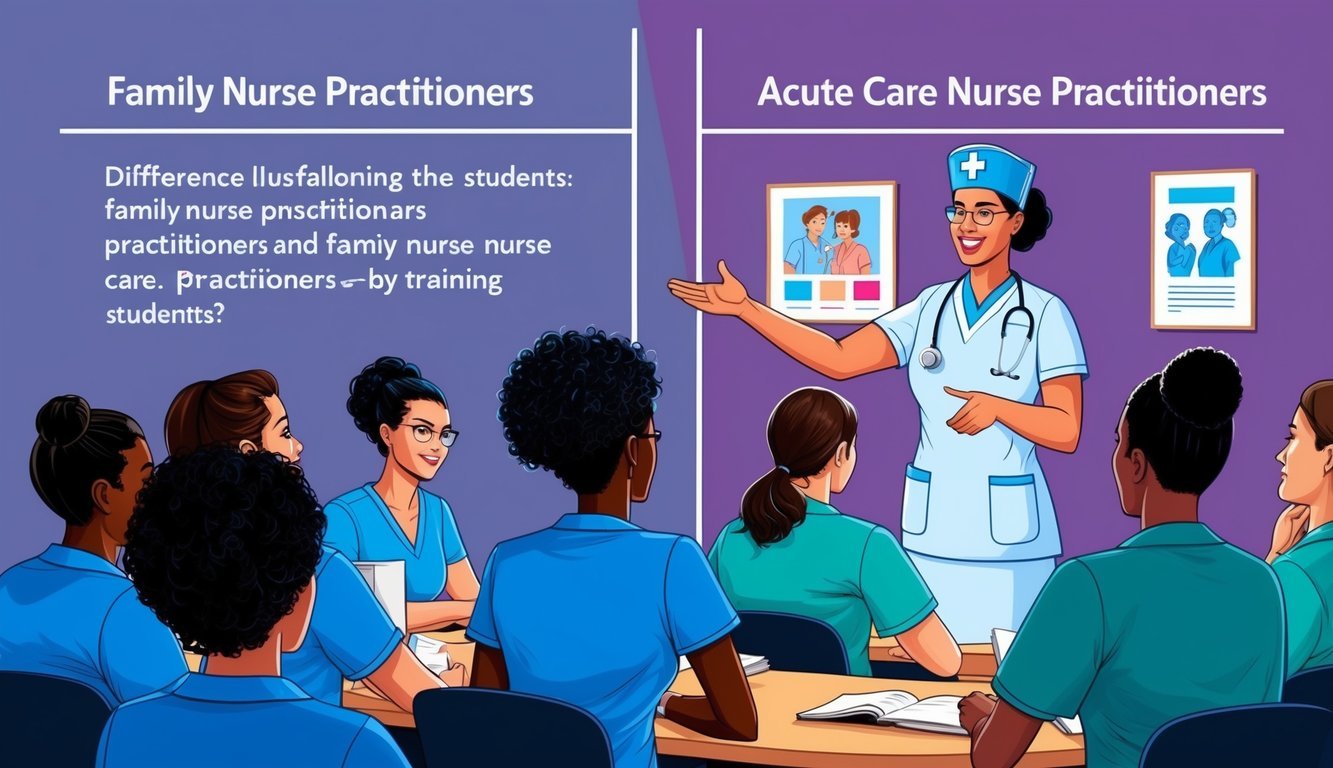When considering a career in nursing, you may find yourself weighing the choices between Family Nurse Practitioners (FNPs) and Acute Care Nurse Practitioners (ACNPs). FNPs specialize in providing comprehensive primary care across all ages, while ACNPs focus on managing acute and critical conditions in healthcare settings. Understanding these differences is essential for making an informed choice that aligns with your career goals and interests.
Both pathways offer unique opportunities and challenges, appealing to different aspects of patient care.
For instance, FNPs typically practice in outpatient settings, providing ongoing healthcare to families and individuals, whereas ACNPs often work in hospitals, addressing urgent health needs.
As you explore these roles, knowing the educational requirements and potential salaries can also influence your decision-making.
Dive deeper into the specifics of these nursing roles and uncover the key differences that may impact your future career.
Explore how these distinct specialties cater to varying patient needs and learn what it takes to become an effective practitioner in either field.
For detailed comparisons, you can gain insights from resources like NursingProcess.org and NurseJournal.org.
Comparing FNP and ACNP Roles
Understanding the differences between Family Nurse Practitioners (FNPs) and Acute Care Nurse Practitioners (ACNPs) is crucial.
These roles serve distinct purposes in healthcare, focusing on varying patient needs and environments.
Scope of Practice Differences
The scope of practice for FNPs and ACNPs varies significantly.
FNPs deliver comprehensive primary care across the lifespan, addressing a wide range of health issues from preventive care to chronic disease management.
They focus on long-term patient relationships and wellness, emphasizing education and health promotion.
In contrast, ACNPs specialize in acute care contexts, managing critically ill patients often in emergency rooms or intensive care units.
Their training equips them to respond to immediate, complex medical conditions, requiring timely intervention and advanced clinical skills.
This distinction shapes how each role approaches patient care.
Work Environments: ER and Intensive Care Units
FNPs typically operate in primary care settings such as clinics, community health centers, and private practices.
They collaborate with other healthcare providers to manage patient care over time, focusing on continuous health monitoring.
In contrast, ACNPs work primarily in high-acuity environments like emergency rooms (ER) and intensive care units (ICUs).
These settings demand quick decision-making and advanced diagnostic abilities to stabilize patients.
ACNPs often function as part of a multidisciplinary team, providing acute interventions and ongoing patient assessments in critical situations.
Patient Populations and Health Conditions
FNPs care for individuals across all age groups, often managing chronic conditions such as diabetes, hypertension, and mental health issues.
Their holistic approach includes fostering relationships that allow for preventive care and lifestyle modifications.
On the other hand, ACNPs primarily treat adults experiencing acute health crises, including trauma, severe infections, and post-operative complications.
Their focus on acute conditions necessitates a robust knowledge base of pharmacology and critical care protocols.
Familiarity with protocols in these high-pressure environments is crucial for successful patient outcomes.
For more in-depth insights, consider exploring NursingProcess.org for details on the distinctions between these roles.
Education and Training Requirements

Understanding the educational pathways and training involved in becoming a Family Nurse Practitioner (FNP) or an Acute Care Nurse Practitioner (ACNP) is crucial for aspiring professionals.
This section outlines the degrees, certifications, clinical hours required, and the importance of continuing education.
Degrees and Certification
To become an FNP or ACNP, you must first obtain a Bachelor of Science in Nursing (BSN).
Following this, most candidates pursue a Master of Science in Nursing (MSN) or a Doctor of Nursing Practice (DNP).
FNPs specialize in providing holistic care across all ages, while ACNPs focus on adults in acute settings.
Both paths require national certification, often provided by organizations like the American Association of Nurse Practitioners.
| Degree | Duration | Certification |
|---|---|---|
| BSN | 4 years | N/A |
| MSN | 2-3 years | FNP/ACNP National Certification |
| DNP | 3-4 years | DNP National Certification |
Clinical Hours and Specialty Focus
Clinical hours are an essential component of your education.
Most MSN programs require 500-1,000 clinical hours, which can include hands-on experience in hospitals and primary care settings.
FNP training often focuses on managing chronic diseases and preventive care, while ACNP training emphasizes acute care management.
The clinical settings allow you to apply theoretical knowledge in practical environments, enhancing your skills.
Continuing Education for Professional Development
Once certified, continuing education is vital for maintaining your certification and staying current in the field.
Most states require continuing education credits to renew your license.
You can find online courses, workshops, and webinars through various platforms including the American Association of Nurse Practitioners.
Engaging in ongoing education not only fulfills requirements but also enriches your practice, ensuring you provide the best care for your patients.
Staying informed about new research and treatment protocols is essential for both FNPs and ACNPs to adapt to the evolving healthcare landscape.
Licensure and Certification

Navigating licensure and certification is crucial for both Family Nurse Practitioners (FNPs) and Acute Care Nurse Practitioners (ACNPs).
Each specialty has specific requirements that you must consider to practice effectively and legally.
National and State Licensure for FNPs and ACNPs
To practice as an FNP or ACNP, you must obtain both national and state licensure.
The national certification typically follows successful completion of an accredited graduate program.
For FNPs, this often involves the Family Nurse Practitioner certification through the American Academy of Nurse Practitioners (AANP).
For ACNPs, you will pursue certification through distinct bodies, typically focusing on acute care.
State licensure requirements vary, necessitating you to check with your state board of nursing for specific mandates, including background checks and continuing education.
Specialty Certifications for Practice
In addition to general licensure, specialty certifications enhance your qualifications and may broaden your job opportunities.
For example, the American Association of Critical-Care Nurses (AACN) offers acute care certification specifically for ACNPs.
FNPs may also seek advanced certifications in pediatric care or geriatrics through organizations like the Pediatric Nursing Certification Board.
These credentials affirm your expertise and commitment to continued education in your chosen field, ultimately benefiting your career and patient care.
Understanding these details ensures compliance with regulatory standards and keeps your practice aligned with your professional goals.
Career Prospects and Work Opportunities
The field of nurse practitioners, particularly Family Nurse Practitioners (FNPs) and Acute Care Nurse Practitioners (ACNPs), presents promising career prospects and diverse work opportunities.
Understanding the job outlook, salary potential, and various healthcare settings can help you navigate your career path effectively.
Job Outlook and Demand
The demand for nurse practitioners is robust and continues to grow, driven by an aging population and an emphasis on preventive care.
According to the U.S. Bureau of Labor Statistics, employment for nurse practitioners is projected to grow by 40% from 2021 to 2031, significantly faster than the average for all occupations.
This surge in demand means that you will find more job opportunities in various settings.
Both FNPs and ACNPs are essential for addressing the increasing healthcare needs, particularly in underserved areas.
Your ability to provide specialized care will position you favorably in the job market.
Salary Comparisons and Earning Potential
Compensation varies between FNPs and ACNPs, influenced by factors such as geographic location, years of experience, and work settings.
Here’s a summary of the average annual salaries:
| Nurse Practitioner Role | Average Salary | Salary Range |
|---|---|---|
| Family Nurse Practitioner | $115,000 | $90,000 – $150,000 |
| Acute Care Nurse Practitioner | $120,000 | $100,000 – $160,000 |
ACNPs typically earn slightly more due to their specialization in acute care settings.
Your salary potential can also increase with additional certifications or advanced training.
Prospects in Various Healthcare Settings
Both FNPs and ACNPs have opportunities in diverse healthcare environments.
FNPs often work in primary care clinics, family practices, and community health organizations.
They serve patients of all ages, offering comprehensive care.
ACNPs, on the other hand, are found primarily in hospitals, intensive care units, and emergency departments.
Their focus on urgent and critical care allows them to address complex patient needs effectively.
As a graduate entering this field, you can choose a path that aligns with your interests and desired work environment.
Specializations and Advanced Practices
The field of nurse practitioners offers various specializations, allowing you to cater to specific patient populations.
Understanding these specializations can enhance your capabilities and effectiveness as a nurse practitioner.
Pediatric and Gerontological Acute Care
Pediatric Nurse Practitioners (PNPs) and Adult-Gerontology Acute Care Nurse Practitioners (AG-ACNPs) are two common specializations.
PNPs provide care for acute and chronic conditions in infants through adolescents.
They focus on developmental needs and family dynamics.
On the other hand, AG-ACNPs care for adults, including the elderly.
They must understand the intricacies of aging, providing services such as chronic disease management, acute hospitalization, and transitional care.
This specialization is crucial in addressing the unique health challenges that arise with age.
Nursing Specialties in Women’s and Mental Health
Women’s health nursing focuses on a range of health issues specific to females, including reproductive health, pregnancy, and menopause.
Practitioners in this field serve as primary care providers, guiding patients through preventative measures and treatments.
They need knowledge about hormonal therapies, prenatal care, and screenings.
Mental health nursing is another critical specialty.
Nurse practitioners in this area diagnose and treat mental health disorders, providing therapy and medication management.
Understanding psychological, emotional, and social factors is vital for effective care.
Their role often includes collaboration with other health professionals to ensure comprehensive patient care.
The Role of NPs in Preventative Care and Disease Prevention
Nurse practitioners play a significant role in preventative care and disease prevention.
They conduct health screenings, immunizations, and patient education.
NPs can assess risk factors to create tailored health plans that promote well-being.
The increasing focus on chronic disease management highlights the importance of lifestyle interventions.
NPs provide counseling on nutrition, exercise, and stress management.
This empowers patients to take charge of their health.
This proactive approach can lead to better health outcomes, reducing the burden of acute conditions and improving overall community health.

